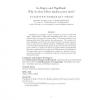1690 search results - page 89 / 338 » Term Ranking for Clustering Web Search Results |
IADIS
2004
14 years 11 months ago
2004
Relevance feedback has been considered as a means of incorporating learning into information retrieval systems for quite sometime now. This paper discusses the research results of...
103
click to vote
IM
2007
14 years 9 months ago
2007
PageRank is a popularity measure designed by Google to rank Web pages. Experiments confirm that PageRank values obey a power law with the same exponent as In-Degree values. This ...
WWW
2007
ACM
15 years 10 months ago
2007
ACM
Search engines provide a small window to the vast repository of data they index and against which they search. They try their best to return the documents that are of relevance to...
CIKM
2009
Springer
15 years 2 months ago
2009
Springer
Traditional ranking mainly focuses on one type of data source, and effective modeling still relies on a sufficiently large number of labeled or supervised examples. However, in m...
108
click to vote
WSDM
2012
ACM
13 years 5 months ago
2012
ACM
Today’s Web browsers allow users to open links in new windows or tabs. This action, which we call ‘branching’, is sometimes performed on search results when the user plans t...

